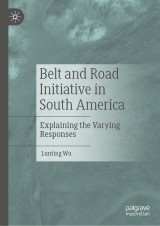Details

Belt and Road Initiative in South America
Explaining the Varying Responses|
128,39 € |
|
| Verlag: | Palgrave Macmillan |
| Format: | |
| Veröffentl.: | 12.07.2024 |
| ISBN/EAN: | 9789819715459 |
| Sprache: | englisch |
| Anzahl Seiten: | 300 |
Dieses eBook enthält ein Wasserzeichen.
Beschreibungen
<p>This book is concerned with the varying responses of South American countries to the Belt and Road Initiative (BRI). Since Beijing launched the Belt and Road Initiative in 2013, 3/4 of countries in the world have engaged with China's arrangement of promoting global physical and digital connectivity. This still leaves a quarter of them that have refused China’s offer so far or withdrawn. How do we account for why countries chose to join the BRI while others do not? Research on South American countries’ responses to the BRI is scant, but the topic is pertinent. While the great-power competition and systemic rivalry have spoiled the appetite of European countries to intensify their ties with China, many developing countries seem to be rather interested. This book will interest scholars of international political economy, geopolitics, foreign policy and international development.<br></p>
<p>Chapter 1: Contextualising the Belt and Road Initiative in South America.- Chapter 2: Foreign Policy Analysis: South American Countries’ Foreign Policy towards the BRI.- Chapter 3: Chile and the Belt and Road Initiative.- Chapter 4: Colombia and the Belt and Road Initiative.- Chapter 5: Brazil and the Belt and Road Initiative.- Chapter 6: Business Preferences, State Structure, and Foreign Policy.</p><br><p></p>
<b></b><b>Lunting Wu</b> is a postdoctoral researcher at the Centre for East European and International Studies (ZOiS) in Berlin, an associate in the Cluster of Excellence "Contestations of the Liberal Script" and the Center for European Integration at Freie Universität Berlin, and a fellow at FGV Europe and the Instituto do Oriente of the University of Lisbon. He holds a PhD in International Relations from Freie Universität Berlin.
<p>This book is concerned with the varying responses of South American countries to the Belt and Road Initiative (BRI). Since Beijing launched the Belt and Road Initiative in 2013, 3/4 of countries in the world have engaged with China's arrangement of promoting global physical and digital connectivity. This still leaves a quarter of them that have refused China’s offer so far or withdrawn. How do we account for why countries chose to join the BRI while others do not? Research on South American countries’ responses to the BRI is scant, but the topic is pertinent. While the great-power competition and systemic rivalry have spoiled the appetite of European countries to intensify their ties with China, many developing countries seem to be rather interested. This book will interest scholars of international political economy, geopolitics, foreign policy and international development.</p>
<p><b></b><b>Lunting Wu</b> is a postdoctoral researcher at the Centre for East European and International Studies (ZOiS) in Berlin, an associate in the Cluster of Excellence "Contestations of the Liberal Script" and the Center for European Integration at Freie Universität Berlin, and a fellow at FGV Europe and the Instituto do Oriente of the University of Lisbon. He holds a PhD in International Relations from Freie Universität Berlin.</p><div></div>
<p><b></b><b>Lunting Wu</b> is a postdoctoral researcher at the Centre for East European and International Studies (ZOiS) in Berlin, an associate in the Cluster of Excellence "Contestations of the Liberal Script" and the Center for European Integration at Freie Universität Berlin, and a fellow at FGV Europe and the Instituto do Oriente of the University of Lisbon. He holds a PhD in International Relations from Freie Universität Berlin.</p><div></div>
Explores the impact of BRI in latin america Analyzes Chinese resource markets in latin america Gives country studies of south american nations
Diese Produkte könnten Sie auch interessieren:

Preispolitik. Preisgestaltung und Preispolitik am Beispiel der Planspielunternehmen

von: Marcel Steininger

16,99 €
















